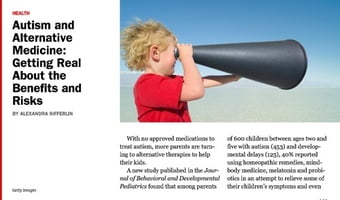With no approved medications to treat autism, more parents are turning to alternative therapies to help their kids.
A new study published in the Journal of Developmental & Behavioral Pediatrics found that among parents of nearly 600 children between ages 2 and 5 with autism (453 kids) and developmental delays (125 kids), 40% reported using homeopathic remedies, mind-body medicine, melatonin and probiotics in an attempt to relieve some of their children’s symptoms and even prevent some of the condition’s behavioral problems from progressing.
Such use of complementary and alternative medicine (CAM) was 10% greater than that among nonautistic kids. About 7% of autistic kids were on a special diet such as gluten-free or casein-free, which parents believed could reduce inflammation that may aggravate autism symptoms. While most of the therapies were relatively harmless, a small number of autistic kids, 4%, were using treatments that the study classified as potentially unsafe or unfounded in science, like vitamin B-12 injections.
The researchers therefore urge pediatricians to talk to parents about any complementary treatments they may be using on their kids, and educate well-intentioned parents about the potential risks and benefits of the therapies, including how the compounds may interact with other treatments. Last year, a study in Pediatrics found that CAM was also common among kids with other chronic diseases like asthma.“Regardless of how families make these decisions, health care providers should proactively seek to learn what therapies are being used and engage families in frank discussions about the importance of understanding concepts such as the hierarchy of evidence and of making treatment decisions based on current knowledge of safety and efficacy,” the authors write.
Understanding parents’ frustration over the lack of drug-based treatments for autism, experts recommend behavior-based therapies instead; some studies suggested they could lessen some of autism’s symptoms and possibly reverse the brain changes that contribute to the developmental condition.
Source: TIME.com, 11-01-2014.

